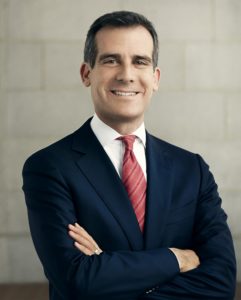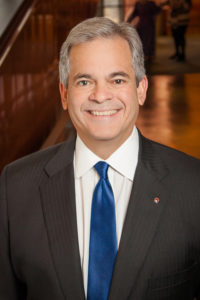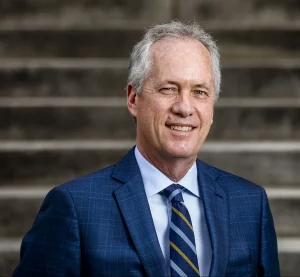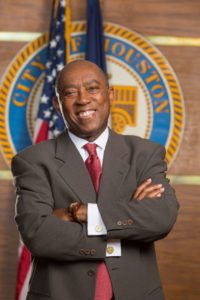Three members of the Climate Mayors’ Steering Committee will soon conclude their terms as city mayors. Yet, their leadership in climate action leaves behind unforgettable legacies.
Several leaders of Climate Mayors will be concluding their terms as mayors and stepping down from their positions within the steering committee. Mayors Eric Garcetti of Los Angeles, Steve Adler of Austin, and Greg Fischer of Louisville have dutifully served their communities as champions for local climate action and progressive policy making. With Climate Mayors’ own co-founder Mayor Garcetti, and others leaving office it seemed timely to take a look back on all the considerable impacts these mayors have made on our climate and their local communities.

Mayor Eric Garcetti has held office since 2013 and in the following year he co-founded Climate Mayors alongside former Mayor Nutter of Philadelphia and former Mayor Parker of Houston. Since then, the bipartisan organization founded to build political will for federal and global climate action has welcomed almost 500 mayors into its fold. In addition to being Chair of Climate Mayors from 2014-2020, he also served as Chair of C40 Cities – a global city-led organization in the fight against climate change – from 2019-2021.
In addition to his national leadership in building political momentum for climate action, Mayor Garcetti holds an impressive track record for environmental wins in LA. Below is just a sampling of the positive change created during his term:
- Launched Los Angeles’ Green New Deal, an ambitious update to the city’s first-ever Sustainable City Plan from 2015. It aims to secure clean air and water and a stable climate, improve community resilience, expand access to healthy food and open space, and promote justice for all
- Established first in the nation Climate Emergency Mobilization Office (CEMO) to foster collaboration with policymakers and community leaders to create opportunities to improve sustainability and resilience at L.A.’s most burdened communities.
- As of 2018, LA had the most solar power installed out of any city in the US and was named the #1 Solar City in America in 8 of the last 9 years
- LA became the first city in the U.S. to launch an electric car share program designed to serve low-income residents in 2017
- Invested $150 million into two LADWP programs targeting low-income multifamily energy efficiency and building electrification, including free upgrades for renters
- Installed the most publicly available and commercial electric vehicle chargers of any city in the nation
- As of 2020, LA’s GHG emissions are down 36%. In 2016 alone, L.A. reduced its city-wide greenhouse gas emissions by 11%, equivalent to taking 737,000 cars off the road
- Created over 60,000 green jobs
- Attracted $695 million in green investments and supported 340 startups as of June, 2022 through the LA Cleantech Incubator
“In the year 2100, when the human race looks back at the challenges this century brought us, I know they will be grateful for everything Mayor Garcetti and the City Council accomplished in this past decade on climate, and for everything we are going to accomplish next.” – Los Angeles City Councilmember Paul Koretz.
“We appreciate the leadership and partnership of the Mayor’s Office in championing innovative and equitable solutions to the health, climate, and environmental justice threats our communities face. The establishment of the first-in-the-nation Climate Emergency Mobilization Office is a lasting legacy that will center frontline, indigenous and vulnerable communities in policy design, and will ensure that the benefits of a just transition will be shared by all.”
– Martha Dina Argüello, Executive Director Physicians for Social Responsibility – Los Angeles

Mayor Steve Adler has held office in Austin since 2015 and will term out of office in January 2023. On the national stage, Mayor Adler has served on the Climate Mayors steering committee since 2019 and has been a member of C40 Cities since 2006. Climate leadership on this stage – from a Texas mayor – exemplified how climate progress can even take shape in states historically tied with fossil fuel production and consumption.
During his time in office, Mayor Adler has been a progressive force for climate action in the red state of Texas. Below are some examples of transformative work at the local level:
- Project Connect is a new light rail and bus network designed to connect neighborhoods around Austin. It aims to improve access to daily needs like jobs, healthcare, and education. By reducing people’s reliance on cars, the project also aims to play a role in tackling Austin’s carbon footprint and helping the City of Austin reach its goal of net-zero emissions by 2040
- A 400-mile All Ages and Abilities Bicycle Network is being built throughout the city to help Austin achieve its mode-shift goals. Late last year, 215 miles — over 50% — of the network had been completed.
- In 2021, the revised and updated Austin Climate Equity Plan was adopted by Council. Austin’s original climate plan was adopted by the City Council in 2015, with the goal of achieving net-zero emissions by 2050 and the intention of updating the plan every 5 years. The revised plan accelerates Austin’s goal to become a Net Zero city by ten years – from 2040 to 2050.
- Created new green jobs with an equity lens through the Austin Civilian Conservation Corps
- The Community Climate Ambassadors Program recruits individuals to host community conversations and lead projects with historically underrepresented groups about climate change, racial equity, and sustainability
- The Austin Youth Climate Equity Council empowers Austin’s next generation of climate champions with the tools to engage in community issues around climate change, environmental policy, and environmental justice
- Awarded 493 Bright Green Future Grants to Austin area schools for sustainability-focused projects and education. 70% of all Title 1 schools in Austin have received funding, which includes schools with higher numbers of students from low-income families
- Adopted the 2021 Residential International Energy Code which, will save energy and GHG emissions, and remove mandatory natural gas hookups for residential homes
“The most important lesson learned here is that we will never come close to overcoming climate change without centering racial equity and community leadership.” Shane Johnson, Sierra Club, Austin Office of Sustainability Steering Committee Tri-Chair
“It is not the power of one but the power of many perspectives, communities, and knowledge to shift the direction of climate impacts.” – Shaun Auckland, SPEER , Austin Office of Sustainability Advisory Group Member

Mayor Greg Fischer has held office in Louisville, Kentucky for over a decade, beginning in 2011 and closing out in January of 2023. Fischer has been active on the national and global level as a champion for climate action through service on the Climate Mayors steering committee and participation in Global Covenant of Mayors. Mayor Fischer also signed the We’re Still In letter, committing Louisville to pursue the requirements outlined in the Paris Climate Agreement, regardless of national leadership decisions. His keen awareness of the ramifications that city emissions have on the national and global environment turbocharged actions taken at the local level.
During his terms, clean energy and resilience were top of mind as showcased in the achievements here:
- Mayor Greg Fischer created the Office of Sustainability in 2012 and tasked the office with drafting the city’s first-ever sustainability plan, Sustain Louisville
- Adoption of the original Sustain Louisville Plan in March 2013
- In 2022, Mayor Fischer signed an executive order committing Louisville to the science-based target of net zero greenhouse gas emissions community-wide by 2040. The order was an update to prior set goals of 80% reduction in greenhouse gas emissions community-wide by 2050, and helps Louisville meet its commitment under the Cities Race to Zero. Following this Executive Order, Louisville Metro Council passed a resolution reaffirming the same goal, building on a previous resolution for 100% renewable electricity for Metro operations by 2030, 100% clean energy for Metro operations by 2035, and 100% clean energy community-wide by 2040
- Since 2016, Louisville Metro has leveraged over $15 million in private capital toward energy efficiency and renewable energy projects through its Energy Project Assessment District (EPAD) Program, a financing mechanism that allows non-residential property owners to repay private loans for energy improvement projects.
- In September 2019, Mayor Fischer declared a Climate Emergency at a youth-led climate strike to recognize the urgency to halt, reverse, mitigate, and prepare for the consequences of climate change and restore the climate for future generations. Hundreds of Louisville students, parents, concerned citizens, and politicians joined cities around the world in a day of global protest to demand action on climate change.
- On April 4, 2022, Louisville Metro was accepted into the U.S. Department of Energy’s Communities Local Energy Action Program (LEAP) pilot which provides technical assistance to cities to develop sustainability programs that benefit environmental justice communities.
- The Solar Over Louisville campaign was launched in June 2022. The plan encourages residents to install solar panels and simplifies the process of doing so
- Louisville received the distinction of being one of less than 100 cities around the world to make CDP’s annual A List in 2021 and 2022. The global environmental nonprofit’s list recognizes major progress in climate action and transparency.
“As Louisville Metro Government’s leading Community Partner in the sustainability space, the Louisville Sustainability Council is honored to have had the opportunity to work so closely with Mayor Fischer over the years. Mayor Fischer has greatly contributed to helping our city dream and achieve significant sustainability milestones. We will deeply miss Mayor Fischer’s energy, passion, and support for climate mitigation and education.” – Julia Murray, Executive Director, Louisville Sustainability Council
The Climate Mayors organization thanks Mayors Garcetti, Adler, and Fischer for their commitment to maintaining focus on one of the most pressing issues of our lives. They challenged the organization and their cities to reach new heights in promoting climate justice, equity and sustainability for all. “It has been an honor to work alongside these mayors. Their dedication to climate resilience, emissions reduction, environmental justice, and community prosperity has produced positive impacts that will be felt for generations to come,” said Kate Wright, Climate Mayors’ Executive Director. “Their climate leadership will serve as a guiding light to their successors and we aim to continue to make bold and inspired climate action in Los Angeles, Austin, and Louisville going forward.”
###
For media inquiries please contact climatemayors@fgsglobal.com




